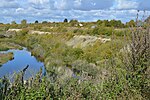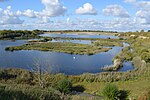Pitstone
Civil parishes in BuckinghamshirePitstoneVillages in Buckinghamshire

Pitstone (formerly Pightelsthorn, with possible variation Pychelesthorn in 1399) is a village and civil parish in east Buckinghamshire, England. It is at the foot of the central range of the Chiltern Hills, centred 6 miles (10 km) east of Aylesbury and 5 miles (8 km) south of Leighton Buzzard. It directly adjoins the village of Ivinghoe, and the two villages share some facilities.
Excerpt from the Wikipedia article Pitstone (License: CC BY-SA 3.0, Authors, Images).Pitstone
Brächer Heide,
Geographical coordinates (GPS) Address Nearby Places Show on map
Geographical coordinates (GPS)
| Latitude | Longitude |
|---|---|
| N 51.82564 ° | E -0.6302 ° |
Address
Brächer Heide 24
51674 , Brächen
Nordrhein-Westfalen, Deutschland
Open on Google Maps









